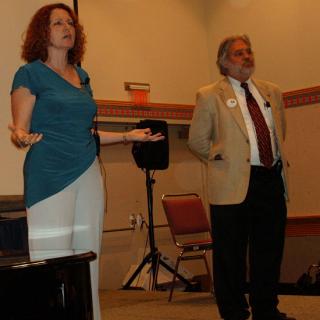Anxiety, Change, and Leadership in Congregations

Connie Goodbread and Rev. Dr. Richard Speck
General Assembly 2007 Event 3033
Presenters: Rev. Dr. Richard Speck, District Executive, Joseph Priestley District; and Connie Goodbread, Acting Lifespan Program Consultant, Florida and MidSouth Districts
About 250 people attended this workshop with eager anticipation towards understanding how systems thinking can be applied to their congregations. A show of hands indicated that the majority of the workshop attendees are congregational presidents who had also attended Unitarian Universalist (UU) University earlier in the week.
The Reverend Dr. Richard Speck has been the District Executive of our Joseph Priestley district for seven years and has spent the last five years studying how people operate in an emotional system, which he admits, is “a work of a life-time.” Emotional, in this context, he explained, describes the instinctual and reactionary response to situations, without carrying the negative connotation of irrationality that is often associated with the word.
Connie Goodbread is acting Lifespan Program Consultant in the Florida and Mid South districts as well as a Healthy Congregation trainer. She has studied under Peter Steinke, the Lutheran pastor, counselor, and teacher who authored the book Healthy Congregations: A Systems Approach. Steinke’s work is modeled after Family Systems Theory as developed by Murray Bowen and Rabbi Edwin Friedman, using systems analysis to look at and understand congregations to be like families and other entities.
Speck and Goodbread alternately presented the theories and concepts of systems thinking as applied to congregations and discussed the role of leadership in dealing with anxieties within their congregations. The presentation was interspersed with cartoons that were both humorous and to-the-point, injecting fun and enjoyment into an otherwise very serious topic.
Systems thinking helps congregational leaders to see that everything is related to everything else and a single action is linked to others in surprising way. No one is an island. Our action affects others and we can never do “just one thing.” In times of conflicts and crisis, this way of thinking becomes very useful. As leaders, we sometimes need to “stand still and do nothing,” or at least nothing in haste.
When a system is at rest (homeostasis), it remains at rest and change is difficult. When a change takes someone outside his/her comfort zone, it causes anxiety. A small amount of anxiety is healthy, and is necessary to help us survive. Too much anxiety, on the other hand, becomes debilitating and paralyzing. A healthy system can handle anxiety with resiliency and grows from it. Understanding systems thinking helps leaders become more effective in dealing with conflict situations.
A church that always does things the same way remains stuck and resists being changed. A healthy church is a growing church simply because healthy congregations attract new people. Typically, when a new idea or a proposed change is presented, the first answer is “no.” But when 2% of the stake holders buy into it, the idea is heard. When 5% do so, the idea is imbedded; and when 20% of the people buy into it, it is unstoppable.
After defining the qualities of effective leadership, the presenters left us with several quotations that are wise, inspiring, thought-provoking, and will serve us in our work as leaders of our congregations.
“We are adults. We can choose to not be offended.”
—Fred Luskin.“Not everything that is faced can be changed, but nothing can be changed until it is faced.”
—James Baldwin.
Reported by Kok Heong McNaughton; edited by Pat Emery.